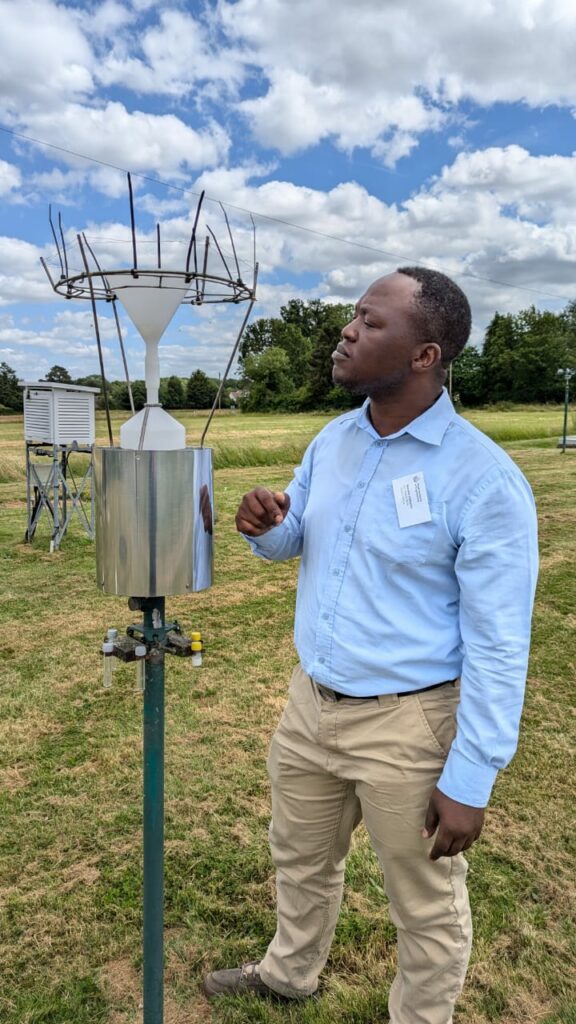A near-fatal accident could have ended it all for BANDILE DLABANTU but he quickly moved on to accomplish his dreams, setting up a biotech company transforming waste into value.
THE 2013 collision that resulted in Bandile Dlabantu’s vehicle rolling onto the opposite side of the road after being hit by a bus that lost control could easily have been fatal. Instead, it served as a catalyst for one of Africa’s most innovative waste management solutions.
“Life can end this quickly. I could have been gone in that moment…” Dlabantu recalls thinking as he emerged from the wreck with only a few bruises and a handful of glass cuts. “I thought to myself, if I can go through that and walk out, what’s stopping me from doing whatever it is that I want to do?”
That revelation nurtured a seed that had already been planted — to pioneer an alternative approach to farm feed production. The idea had fascinated Dlabantu since his days studying entomology and microbiology at South Africa’s Rhodes University when he stumbled upon a research paper from 1947 which predicted that rising fuel prices and fish feed costs would eventually necessitate alternative protein sources.
Like many other African countries, South Africa’s farming industry relies principally on fishmeal and soy, both of which are imported as not enough is produced locally. Coupled with climate change and a volatile global market, the impact filters its way down to the consumer, both financially and nutritionally.
Loading...

Despite a career spent predominantly in a suit and tie, Dlabantu’s upbringing amidst the farmlands of South Africa’s Eastern Cape would prove to be his most valuable role in the end. School holidays involved helping his grandmother to prepare and harvest the fields, while watching his grandfather devise creative methods for cutting down the cost of chicken feed. “He would take manure, water it, cover it with sacks, and let it sit. Then he would rake it and let the chickens go through it, because it would attract bugs to break it down,” Dlabantu explains. “I never realized that the solutions I grew up with would become the foundation of my career.”
The process of using insects, not just as protein-rich, cost-effective animal feed, but also as a means to address the issue of organic waste, would become Khepri. The name derives from that of the ancient Egyptian deity Khepri or Khepera, who is depicted as a dung beetle and represents the renewal of life — a fitting metaphor for a bio-tech company that transforms waste into valuable resources. Khepri’s model involves deploying onsite bioconversion units to businesses, allowing organic food waste, such as vegetable offcuts and restaurant scraps, to be processed into insect meal directly at the source.
“Insects are nature’s recyclers,” Dlabantu explains.
“They can transform waste into high-value protein and fertilizer, addressing both food insecurity and environmental degradation.”
The stars of Dlabantu’s production are the Black Soldier Flies (BSF) which consume the refuse. Their short growth cycle of just 15 days allows them to be easily reared, while they come with the added benefit of generating enzymes that kill bacteria and producing short-form proteins which function as antibiotics.
“The biggest thing that you want to do as a farmer is to make sure that when you feed your animals, you are actually maximizing on the digestibility and the bioavailability of the insect meal. BSF has a digestibility of 90%, compared to soy which is 70%.”
Learning from the failures of predecessors who focused on large centralized facilities, Dlabantu developed a more adaptable approach. The modular bioconversion units which the company has patented can be installed directly at client sites, eliminating the need to transport waste, thus making the process more efficient and cost-effective, while lowering the carbon footprint. The resourceful on-site method was actually prompted by hindrances incurred during Covid-19. The pandemic forced relocation, and the subsequent riots in July 2021 in South Africa led to the theft and vandalization of all company equipment. Just when Dlabantu considered giving up, the Technology Innovation Agency (TIA) provided crucial grant fund- ing in 2022, enabling a fresh start with an even more focused vision.
Since re-establishing operations in 2022, Khepri has maintained a steady 15% year-on-year growth, currently generating an annual turnover of R2 million ($107,000) — all of which is reinvested into research and development. The trajectory is set to change dramatically in 2025, the company’s official technology launch year, through a strategic partnership with South Africa’s Mogale City that Dlabantu projects will quadruple earnings. Today, Khepri operates with a team of 12, with plans to expand to 26 employees by year-end. The company deliberately targets both unskilled workers showing potential and science graduates struggling to find employment, contributing to South Africa’s job creation efforts. While firmly rooted in South Africa, Dlabantu’s ambitions extend to Morocco, the United Kingdom, and France, though he maintains that his heart and company headquarters will always remain in Africa.
“Each setback has reinforced my belief in motion,” he says. “You keep moving until you find a way out.” The philosophy is one which Dlabantu extends to his mentorship of other entrepreneurs through the Gordon Institute of Business Science (GIBS) and the Innovation Hub. “The enemy is lack of motion. Start quickly, fail quickly or succeed quickly, and move on.” It’s a lesson learned from his own journey, where waiting for perfect conditions would have meant never starting at all. Looking back, the 43-year-old wishes he could tell his younger self to “just believe a bit more”. It is advice that resonates with many entrepreneurs. But as Khepri’s journey shows, sometimes the biggest breakthroughs come after the biggest set-backs — we just have to keep moving forward.
Loading...
